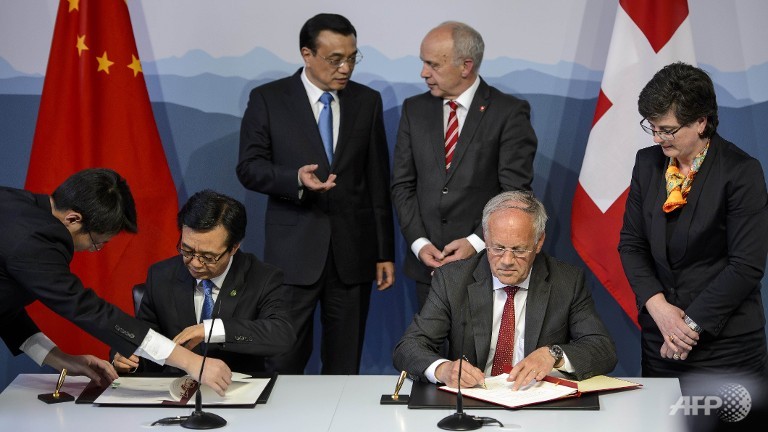Swiss free trade deal underscores China's globalisation: Li

Swiss Economy Minister Johann Schneider-Ammann (sitting R) and the governor of China's central bank,
Zhou Xiaochuan (sitting L), sign a memorandum in front of Chinese Prime Minister Li Keqiang (3L)
and Swiss President Ueli Maurer (3R). (AFP/Fabrice Coffrini)
BERNE: Chinese Premier Li Keqiang on Friday hailed a free trade deal with Switzerland as a landmark achievement, saying it had "huge meaning" for global trade and underscored Beijing's growing openness to the world.
"This free trade deal is the first between China and a continental European economy, and the first with one of the 20 leading economies of the globe," Li told reporters after the two countries inked a preliminary agreement, paving the way for a final signature in Beijing in July.
Li said the implications of the Swiss deal would be felt well beyond the Alpine nation's borders.
"This has huge meaning for global free trade," he said.
"China, a country with a vast population and huge currency reserves, is increasingly internationalising," he underlined, adding that Beijing's strategy of openness was paying dividends.
Swiss President Ueli Maurer dubbed the agreement a "real milestone".
Bilateral trade between Switzerland and China was worth US$26.3 billion in 2012, with a full US$22.8 billion of that figure represented by Swiss exports to China.
That made it one of the rare Western countries to have a positive trade balance with the Asian giant.
In contrast, exports by European economic powerhouse Germany to China in 2012 were worth the equivalent of US$86 billion, and imports from China, US$99.8 billion.
Switzerland's top exports to China are watches, pharmaceuticals and chemicals, and machinery, while textiles and machinery head the list of imported Chinese goods.
The trade talks were launched in 2011.
After wrangling notably over Chinese taxes on imported Swiss industrial goods and Switzerland's rules on China's agricultural exports, the two countries wrapped up technical talks earlier this month.
"We see the deal as something positive," Jean-Daniel Pasche, the head of Switzerland's FHS watchmaking federation, told AFP. "It will give a legal framework to our cooperation."
He said his industry was hoping to see a fall in Chinese import duties on watches -- currently at 12 to 16 per cent -- as well as better safeguards against counterfeiting.
After a formal signature, the deal will still need to clear the Swiss parliament.
Li, who arrived in Switzerland late Thursday fresh from talks in India and Pakistan, is on his maiden foreign trip since becoming premier in Beijing's once-in-a-decade power transfer.
He was set Saturday to leave for Germany, China's top European trade partner.
Unlike Germany, Switzerland is not a member of the European Union, and Li's visit came a month after China signed a free trade deal with Iceland, which also falls outside the 27-nation EU bloc.
The Iceland deal was China's first with a European country, and Beijing has been pressing the EU for a similar accord.
But efforts to strike an overarching deal with the EU are more complicated because Beijing would need to find agreement with the entire bloc.
On Thursday, EU officials said they aimed to negotiate an investment protection agreement with China, which would be the first step on the road to a wider free trade deal, despite a series of tit-for-tat disputes with Beijing.
Bilateral and regional free trade deals -- including a planned EU-US accord and a proposed trans-Pacific agreement -- are sharply in focus amid a deadlock at the World Trade Organization, whose 159 member states have struggled since 2001 to produce a global treaty on liberalising international commerce.
Critics warn that individual accords can create a "spaghetti bowl" of conflicting rules, thereby failing to serve global commerce, but supporters argue that they promote the cause of free trade.
"We don't see a conflict. We see this as complementary. Though maybe with bilateralism you can go just that bit further," Pasche noted.
Besides inking the free trade plan, China and Switzerland signed a raft of cooperation deals Friday, including on boosting financial sector ties.
China is reforming its financial sector, including through lifting restrictions on trading its currency.
With speculation that selected offshore centres could be chosen as currency trading hubs, Switzerland, whose own sector is a major driver of the economy, hopes to be picked.
What the stars mean:
★ Poor ★ ★ Promising ★★★ Good ★★★★ Very good ★★★★★ Exceptional
Latest News
More News
- Russian President congratulates Vietnamese Party leader during phone talks (January 25, 2026 | 09:58)
- Worldwide congratulations underscore confidence in Vietnam’s 14th Party Congress (January 23, 2026 | 09:02)
- Political parties, organisations, int’l friends send congratulations to 14th National Party Congress (January 22, 2026 | 09:33)
- 14th National Party Congress: Japanese media highlight Vietnam’s growth targets (January 21, 2026 | 09:46)
- 14th National Party Congress: Driving force for Vietnam to continue renewal, innovation, breakthroughs (January 21, 2026 | 09:42)
- Vietnam remains spiritual support for progressive forces: Colombian party leader (January 21, 2026 | 08:00)
- Int'l media provides large coverage of 14th National Party Congress's first working day (January 20, 2026 | 09:09)
- Vietnamese firms win top honours at ASEAN Digital Awards (January 16, 2026 | 16:45)
- ASEAN Digital Ministers' Meeting opens in Hanoi (January 15, 2026 | 15:33)
- ASEAN economies move up the global chip value chain (December 09, 2025 | 13:32)
















 Mobile Version
Mobile Version